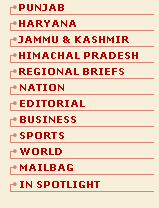 |
Thursday,
May 23, 2002, Chandigarh, India 
|
Indus Water Treaty may go: PM Jammu, May 22 An indication to this effect was given by the Prime Minister, Mr Atal Behari Vajpayee, to senior functionaries of the state government and political leaders who called on him during his 16-hour stay here. Mr Vajpayee flew to Srinagar this morning. In an interaction with the editors of Jammu-based newspapers here last night, the Prime Minister said the government was examining as to how the waters of the Indus, the Chenab and the Jhelum which were covered under the treaty, could be stopped from flowing into Pakistan. During his detailed discussion with the Governor, Mr G.C. Saxena, the Chief Minister, Dr Farooq Abdullah, senior functionaries of the Army, including Lt-Gen J.B.S. Yadava, Corps Commander, and civil and police officers, stress was laid on stepping up counter-insurgency operations against the militants operating within the state. The Prime Minister agreed to the suggestion of the Chief Minister that aerial support be provided to the troops engaged in flushing out terrorists in the hilly areas. Mr Vajpayee also agreed to strengthen the Village Defence Committees and was repeatedly reminded that sanction was required for sending additional companies of paramilitary forces to the state for taking care of the grey areas following withdrawal of troops from the depth areas of the state for deployment on the LoC and the IB. When the BJP delegation led by Mr D.K. Kotwal met the Prime Minister here last evening, Mr Vajpayee posed a question: “What should be done to check military related violence?” The BJP members sang in a chorus: “Declare war against Pakistan.” Mr Vajpayee heard the suggestion patiently, but did not comment. The same suggestion was given by leaders of the Congress, the BSP and other political parties. In his meeting with 15 delegations of political leaders, border migrants, Kashmiri Pandits and leaders of commerce and industry, the Prime Minister adopted the role of a listener instead of a commentator. The plight of border migrants and refugees from Pakistan, PoK and the Kashmir valley figured in his discussions with different political leaders. Mr Vajpayee nodded his head while accepting the Congress and the BJP demand for proper rehabilitation of these refugees. The Congress leaders, including Mr Mangat Ram Sharma, demanded full citizenship rights for these refugees. Mr Ayub Khan, also of the Congress, told the Prime Minister that the Indus Water Treaty be scrapped forthwith. These political leaders expressed deep concern over the security situation and referred to the killing of Lone, saying that it indicated that the security scenario was grave in the state. Mr Vajpayee evinced keen interest when one BJP leader informed him that there was need for screening a section of border villagers in the Jammu sector because some of them had been working as agents of the ISI. He assured the BJP delegation that the matter would be examined seriously. The Congress delegation pressed for his intervention to force the National Conference leadership to withdraw the Resettlement Act and the resolution for the restoration of greater autonomy. |
|||||
|
Patience
has ended: India New Delhi, May 22 Foreign Secretary Chokila Iyer made these observations to the
expelled Pakistan High Commissioner Ashraf Jehangir Qazi who met her
this afternoon for 30 minutes on a courtesy call before he leaves for
Pakistan on May 26.
A spokesperson for the Ministry of External Affairs told reporters
that the Foreign Secretary told Mr Qazi in no uncertain terms that
“no one in India takes the possibility of a war lightly. Ms Iyer
pointed out to Mr Qazi that India had been responding in “a
calculated and gradual manner” since the terrorist attack on
Parliament on December 13.
The Pakistani envoy was told that it was incorrect on behalf of
Islamabad to view the current situation between the two countries
merely as an attempt at “ratcheted” tension. “Our patience with
terrorism has exhausted.”
The spokesperson quoted the Foreign Secretary as having told Mr
Qazi that “Pakistan should not live under any illusion that it can
capture Jammu and Kashmir. Kashmir was, is and shall remain an
integral part of India.” The Pakistani envoy was told in clear terms
that Islamabad had still not been able to read the mood and
determination of this country to fight terrorism in all its forms and
manifestations.
Ms Iyer said Pakistan’s approach towards “genuine concerns”
of New Delhi on terrorism was “unacceptable” to India. India felt
that the problem lay in Pakistan’s attitude of “compulsive
hostility”. Despite violence, the Indian leadership tried to engage
in the dialogue process, hoping that Pakistan would give up the path
of violence to create a congenial atmosphere for good neighbourly
relations. “However, time and experience have proved otherwise,”
she said.
The envoy was told that for India the December 13 attack on
Parliament was a “watershed”.
|
| | Punjab | Haryana | Jammu & Kashmir | Himachal Pradesh | Regional Briefs | Nation | Editorial | | Business | Sport | World | Mailbag | In Spotlight | Chandigarh Tribune | Ludhiana Tribune 50 years of Independence | Tercentenary Celebrations | | 122 Years of Trust | Calendar | Weather | Archive | Subscribe | Suggestion | E-mail | |